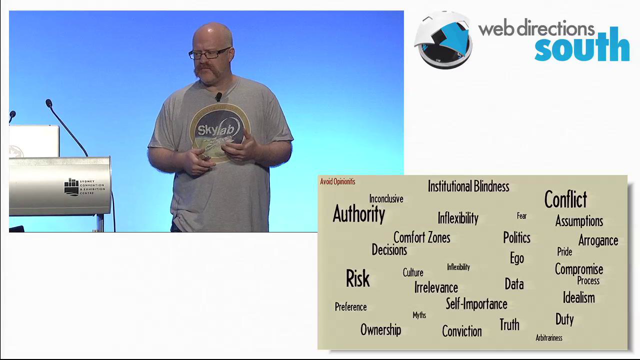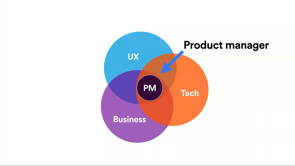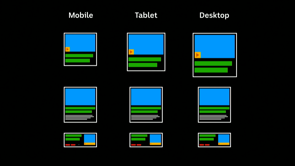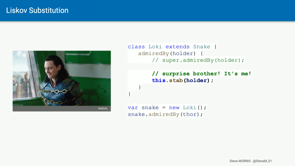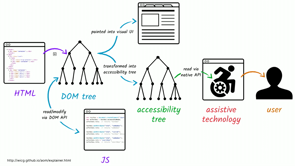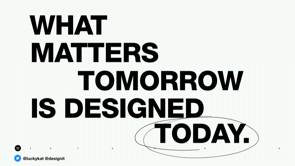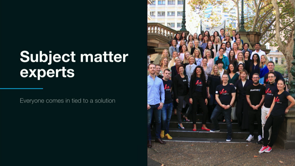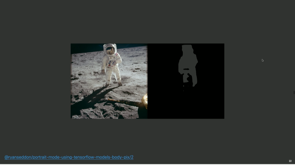Storytelling for influence. A how-to guide to influential storytelling

(funky electronic music) - Okay, good, great.
It's always nerve-racking, but nervousness seems to be my default, so nothing new there.
Okay, so, welcome, welcome, welcome.
I know there's a lot of FOMO because there's so many things happening all at once, so I'm just gonna give the gold away first, okay? So here's the gold.
Here's the three things I'm gonna talk about and after this, if you want to go, you can go. So.
A storyteller's job is to distil complexity, okay? That's the first thing.
The second thing is a way of distilling that complexity is using a story structure that I have mashed up over the years called C.U.P.S, and C.U.P.S stands for, and, wait where's Oliver? Yeah, Oliver said, "Don't give C.U.P.S away yet." But I will.
So C.U.P.S stands for cause, urgency, promised land and then solution, okay, and I'll walk you through that. And then the third thing is in the background, you have to invest in your own likeability. Okay, so.
What the hell does this mean? See the bottom left hand side, or like, on the edge is this complexity, and life is, work is way more complicated, complex, chaotic than you can ever, that you even have the capacity to understand. It is so complex, right? Take yourself back to work and just look at the people around you, maybe there's tonnes, sorry, maybe there is 10, 100, thousands of people, look at what they're doing. They're all on their computers, they're running around, they're going to meeting rooms, you have no idea what they're actually doing. Not a freaking clue what they're doing.
Life is complex.
We are this close to chaos at all times.
This roof could fall down on us.
(audience laughing) No, no, no.
It won't, maybe.
But we are this close to chaos at all times, right? And so that complexity is where a storyteller lives, and your job is to distil that, okay.
I'm gonna say that again, your job is to distil complexity. It's the only thing you do.
Nothing else.
It takes time.
You struggle with it.
It's an artistic, it's intrinsically artistic. Artists struggle, philosophers struggle, all artistic pursuits, they struggle with this. So if you're telling a story for influence in an organisation and you think you can do it from one day to the next, good bloody luck. It takes time, takes a lot of time.
You grapple with it, you wrestle with the devil, right? And your job is to take that complexity, take that chaos and move it up to a simple message.
Because remember, life is way more complex than you can even imagine.
You can't even fathom how complicated it is. And so you wanna tell a story to these people who are lost in this stuff, it better be simple. Better be simple.
That is a storyteller's job.
Okay, so that's point one done.
Point two is I have over the years put this together. It's a story structure I call C.U.P.S, and it stands for cause, urgency, promised land and solution. So what's this look like? Do not bother people with your problems.
Ew, no one cares about your problems, right? What is something that's gonna motivate me and move me, right? So the first 10 seconds of a presentation, this is wisdom from Steve Marsden, maybe, do people understand like, who Steve Mar, yeah? Maybe? He's a god.
Yeah. To me.
Anyway, so he says, "The first 10 seconds of your presentation better be good "because it is sacred." Everyone is like, "Oh, he's gonna talk." And then you say, "Oh, hey, how is everyone?" (blows a raspberry) It's terrible, okay? And the story too is the same.
Don't waste it.
Don't waste that kick-off by talking about your problems, you gotta talk about a cause, right? French Revolution, I like this image because it depicts a cause, okay.
Second thing, I really like this image too, it depicts heaven and hell.
You create a sense of urgency by painting a picture of what the future might look like if you win this battle, right? You're going, you're moving to something new and what does the world look like for people who win in that space? What does it look like for people who lose in that space? That juxtaposition should cause some urgency. If it doesn't, go again.
Once you've created that urgency, you now want to describe the promised land, right? We're doing this cause, we're going somewhere, I understand that I'm gonna win here, these are the stakes, now tell me what it feels like to live in this world.
What might the future be like if you join? And then finally, solution.
Oh, relief.
Relief, okay, tension, tension, tension, tension, relief. Okay? It's just like music, when they're not hitting that note and you're waiting, you're waiting for the, for the bloody note to hit and oh, they keep on teasing it out, teasing it out, and then it hits and it's like, oh, release. Solution is the last thing.
Okay, so I understand that this may be coming across a bit meta, is it? Yeah, a bit? Yeah, okay, great.
So I'm gonna give you an example.
Oh yes, this is my boss, Peter Lee.
At, I can't remember anything.
Anyway, so this is my boss Peter Lee and we are about two years into an agile transformation of Boral.
And so as you can imagine, in agile transformation there is agile theatre, there's agile doing, not agile being, right? So we're trying to move the organisation from theatre to actually doing it, the mindset. So this is a story I used, the story structure, to hopefully convince people how to, on an idea that I had and I keep on fumbling. I'll stop.
Okay, so here it is, I'm labelling the cause, I'm starting with a cause.
We now live in an environment where the fastest learners are the most prepared to lead the market.
Cause again, which puts us in a new era of product development, used to be about requirements, we're doing our job delivery, we're doing all the ceremonies, but where the world is heading is the agile mindset, all right, so that's the cause, and start creating urgency.
Companies are disappearing.
In 1960, the average life was 65 years of companies, 2027 those same companies are expected to only live for 12 years.
Holy hell.
So now I point to a winner.
In 2011 to 2016, a company with an agile mindset kicked off and they generated $1 billion worth of revenue. It's crazy.
Wouldn't mind winning in that space.
Locally, local reference, locally, one, in one year, CBA created the most innovative app, and it hasn't been seen before that there is some space that they carved for themselves in the big four.
Before then, it was just what's the difference? Is it the colours of the logo, is that the difference? So our customers now expect ongoing value, immediate fulfilment and adaptability.
God save us if we don't do this.
So I'm hinting to the loser here.
So what's the common, what's the common thread? I start with a promised land.
Agile mindset is the promised land.
We're gonna beat competitors to market, we're gonna learn and adapt quickly, and we're gonna create real value for customers. Can you imagine coming into work and working in a team where we intellectually spar.
Holy, really? We intellectually spar and then we get to live the life of one of our customers but like, really do that to unlock value.
And then we get to make stuff instead of debating forever. And then when we think about the organisation, we work for a place that doesn't hide failure, things are transparent, and then we learn faster. That's cool.
This is worth your effort, okay.
So making the shift will be hard.
The secret is consistency.
So now solution, okay.
We're going to do high-intensity interval training for the mind, that's how we're gonna do it, in only 15-minute blocks everyday.
It's nothing before we get there, before you know, we'll be there.
Okay.
So again, that story structure is C.U.P.S.
Cause, urgency, promised land and solution. Okay.
I was really struggling for how to transition between point two to point three so I threw some puppies at it.
Yeah, okay, great.
Yeah, cool.
All right, so here's point three.
In the background, you must invest in your own likeability if you're going to be influential.
Do not waffle.
You have to give the gold away first.
No one finds it cute if you sort of hold it on, wait, wait, wait, it's coming, no, people hate it at work, right, people hate that stuff at work.
You gotta give the gold away first.
Which is why I always suggest using deductive communication, which is putting a premise or the conclusion first, and then you give justification and context. I did this at the beginning of it, I gave the gold away first, I told you exactly the three things that I want you to take out from this, and then I said, "If you want, you can go.
"I've given you the best part." Inductive communication is context, situation, building up, and then ends with a conclusion.
And in the workplace, that is waffle.
It comes across as waffle.
Okay, so, second thing is, fill people's buckets with positivity.
You're all a bucket, right? You gotta see other people as buckets.
And the more positive you are, the more positive you are to them, you're filling their bucket with positivity. That's inherently likeable, people love that. You empty their bucket with negativity, people hate that. So if you wanna tell a story to these people, you better be likeable, and you better be positive to them, and it doesn't count if you're just being positive the day of or the week of, all right.
This is something that you do, you continually do deposits. Okay.
Be comfortable and make others comfortable. I was sharing, I've probably gone through about 40-ish loops, iteration loops of this and recently someone said, "Oh, just, people love it when you give personal stories." So, I had some other points to this, but I wanna tell you a story about my own father. My father is a cleaner, or was a cleaner, he's retired now. He used to work for Westfield, the Westfield head office over on 100 William Street.
And that man is, had his own, sort of wrestles with the devil.
And for a couple of years there, he went off track and he was caught drink driving. And he produced two references from two offices that he cleaned in Westfield Towers, and the one reference was from Bob Hawke, and the other one was from Gough Whitlam.
And so my father had been a cleaner there for 30 years, and over that time, he invested, he was so comfortable in his own skin.
He didn't give a shit he was a cleaner, right. I used to go with him to clean, right.
And to see him be likeable to people in the elevator who were way up, and I think he was putting it on for me, 'cause he wanted to show me that like, no one is above you, right? And we were cleaning toilets and all that sort of stuff, right.
He was so comfortable in his own skin.
And then, he would make other people comfortable and call them friends, and they responded to him. And when he was in trouble, he got two references from very important people, right.
So, one of the ways he did this was to use a light touch, right, he was very humorous, he used a lot of sense of humour through his broken English. He didn't take himself too seriously.
So if you want to be likeable, don't take yourself too seriously.
You are human, everyone is human, right.
We all have our faults.
Once you know that, it opens up the world.
Last thing is use self-awareness.
Watch people, watch how people react to you. It's really important.
Really important.
Know what can hurt you, all right.
You have had, have to have your own vision, right. No one's watching out for you except for yourself. So if you can step out of yourself and watch how people are interacting with you, how they react to you, it can really help.
And understand that you have limitations, right. You have limitations.
You can't do everything.
And when you know those limitations, you can call them out, people can't help but try and help you, okay, so that vulnerability is really important.
Okay, so I've got one final thought that didn't fit in the other buckets.
Really great stories evolve over time, all right. So you have to prototype and share your story a million times over.
I think I would've shared this 40-ish times, yeah and it's like nowhere near good.
(audience laughing) So share it a million times, all right? It's really important.
It's the only way you're gonna get to something meaningful. Okay, so your takeouts are a storyteller's job is to distil complexity. The antidote to complexity is simplicity.
Your job is to take complexity and simplify it. That's the storyteller's job.
It takes time.
Second thing is use C.U.P.S, trademarked.
No, I'm kidding.
I should be able to trademark it, anyway.
Yeah, so use C.U.P.S and C.U.P.S stands for cause, urgency, promised land and solution. And then finally, invest in your own likeability. That's it.
Thanks.
(audience applauding) (funky electronic music)





